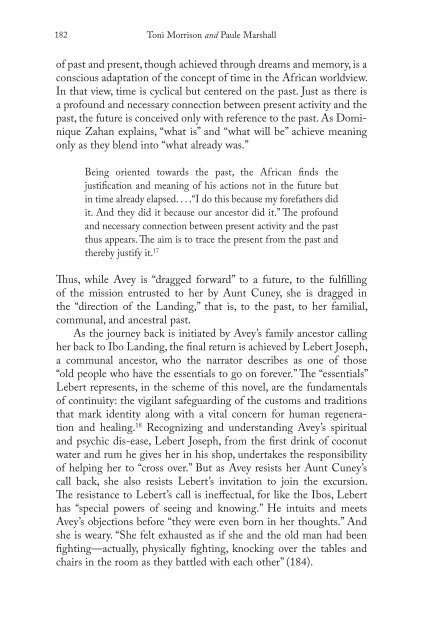Blooms Literary Themes - THE TRICKSTER.pdf - ymerleksi - home
Blooms Literary Themes - THE TRICKSTER.pdf - ymerleksi - home
Blooms Literary Themes - THE TRICKSTER.pdf - ymerleksi - home
You also want an ePaper? Increase the reach of your titles
YUMPU automatically turns print PDFs into web optimized ePapers that Google loves.
182<br />
Toni Morrison and Paule Marshall<br />
of past and present, though achieved through dreams and memory, is a<br />
conscious adaptation of the concept of time in the African worldview.<br />
In that view, time is cyclical but centered on the past. Just as there is<br />
a profound and necessary connection between present activity and the<br />
past, the future is conceived only with reference to the past. As Dominique<br />
Zahan explains, “what is” and “what will be” achieve meaning<br />
only as they blend into “what already was.”<br />
Being oriented towards the past, the African fi nds the<br />
justifi cation and meaning of his actions not in the future but<br />
in time already elapsed. . . .“I do this because my forefathers did<br />
it. And they did it because our ancestor did it.” Th e profound<br />
and necessary connection between present activity and the past<br />
thus appears. Th e aim is to trace the present from the past and<br />
thereby justify it. 17<br />
Th us, while Avey is “dragged forward” to a future, to the fulfi lling<br />
of the mission entrusted to her by Aunt Cuney, she is dragged in<br />
the “direction of the Landing,” that is, to the past, to her familial,<br />
communal, and ancestral past.<br />
As the journey back is initiated by Avey’s family ancestor calling<br />
her back to Ibo Landing, the fi nal return is achieved by Lebert Joseph,<br />
a communal ancestor, who the narrator describes as one of those<br />
“old people who have the essentials to go on forever.” Th e “essentials”<br />
Lebert represents, in the scheme of this novel, are the fundamentals<br />
of continuity: the vigilant safeguarding of the customs and traditions<br />
that mark identity along with a vital concern for human regeneration<br />
and healing. 18 Recognizing and understanding Avey’s spiritual<br />
and psychic dis-ease, Lebert Joseph, from the fi rst drink of coconut<br />
water and rum he gives her in his shop, undertakes the responsibility<br />
of helping her to “cross over.” But as Avey resists her Aunt Cuney’s<br />
call back, she also resists Lebert’s invitation to join the excursion.<br />
Th e resistance to Lebert’s call is ineff ectual, for like the Ibos, Lebert<br />
has “special powers of seeing and knowing.” He intuits and meets<br />
Avey’s objections before “they were even born in her thoughts.” And<br />
she is weary. “She felt exhausted as if she and the old man had been<br />
fi ghting—actually, physically fi ghting, knocking over the tables and<br />
chairs in the room as they battled with each other” (184).

















